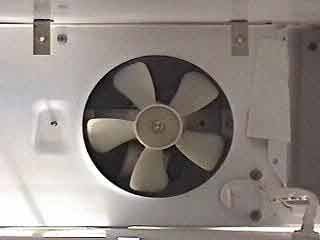A noisy freezer fan can be more than just an annoyance; it might indicate a potential malfunction that could affect the temperature regulation within your freezer and potentially spoil your food. At TheKitchenApplianceDad.com, we understand how crucial it is to maintain your kitchen appliances in top working condition. Today, I’ll walk you through the steps to diagnose and fix a noisy freezer fan.
Before diving into the troubleshooting process, it’s important to understand some of the common reasons why your freezer fan might start making unusual noises:

The most common cause of a noisy freezer fan is the buildup of ice and frost around the fan’s blades. This usually happens when the freezer door is left open too long or is not sealed properly, allowing humid air to enter and frost to accumulate.
Another potential cause could be the fan motor itself. Over time, the motor can wear out and begin to emit loud noises during operation. This issue might require a replacement if the motor is beyond repair.
Sometimes, foreign objects or a buildup of dust and debris can obstruct the fan blades, causing them to make noise as they struggle to spin.
Safety first! Always unplug your appliance before starting any kind of maintenance work to avoid any electrical hazards.
Depending on your freezer model, the fan is typically located behind the inside back panel of the freezer compartment. You’ll need to remove this panel by unscrewing any fasteners and gently pulling the panel out.
Once you have access to the fan, check for any frost or ice buildup around the fan area. If you find ice, carefully defrost it using a hair dryer set on low heat or by letting the freezer defrost naturally after leaving it turned off for a few hours.
Look for any foreign objects or debris that might be obstructing the fan blades. Remove any obstructions carefully using a soft brush or cloth.
Check the fan blades for any signs of damage or wear. Spin the blades with your hand to see if they move smoothly. If there is resistance, or if the blades wobble, this could be a sign that the fan motor bearings are worn out and the motor needs to be replaced.
Once everything is cleaned and inspected, reassemble your freezer and plug it back in. Allow it to reach its operating temperature and check if the fan noise has been resolved.
If after following these steps, your freezer fan is still noisy, it might be time to call in a professional. This is especially true if you suspect the noise is coming from a faulty motor or if the fan blades are significantly damaged. It’s important to address these issues promptly to avoid further damage to your freezer.
To prevent future problems with your freezer fan, consider the following tips:
By following these steps, you should be able to diagnose and potentially fix a noisy freezer fan. Remember, regular maintenance not only helps in keeping your freezer quiet but also extends its lifespan and efficiency. Stay tuned to TheKitchenApplianceDad.com for more tips and advice on keeping your kitchen appliances running smoothly.

